Oct 29, 2019 | Non categorizzato
How are things in Fontem? Many people are asking for the latest news from this the first Focolare small town in Africa, in South East Cameroon, an area afflicted by an ongoing armed conflict. Here is a recent letter from Etiènne Kenfack and Margarit Long, the Focolare coordinators for Fontem, who are currently living about 300km south, in Douala. Dearest friends of Fontem all around the world! Our thanks for expressing such concern about our situation. Your participation gives us joy, comfort and the courage to carry on. The socio-political crisis of this region, which has led to acts of violence, remains unresolved. The sound of gunfire has ceased at present, but the situation remains tense. Life goes on. People are still arriving at our hospital looking for help, even though now we are only able to offer a much reduced service. Over the past few months 1,894 people have come for a consultation. 644 of these were admitted for treatment, including 36 pregnant women who have since given birth. It’s now the rainy season, so we’re trying our best to keep up with essential maintenance on the electricity sub-station which supplies power to all the main infrastructure in Fontem. A small group has remained looking after the Mariapolis Centre, and together with others they’ve formed an amazing team taking care of the grounds in order to prevent the tropical forest from taking over the land. Recently, to everyone’s great joy, Bishop Nkea sent a priest to Fontem once again. This is an unequivocal and tangible sign of the Bishop’s care for the Bangwa people. The new priest is in close contact with the local leaders of our Focolare community there, and of course his presence has facilitated participation in the sacraments, especially Sunday and daily Mass. Also in this most recent period, the anniversaries of two Fontem pioneers – Pia Fatica and Fides Maciel, both buried in our cemetery – were solemnly commemorated. We are very concerned about the exploitation of the media for political gain. All too often we’ve noticed news being circulated which is most definitely incorrect. So we’re appealing to you to regard any news about Fontem, including on personal social media platforms, with the greatest responsibility and prudence. Please try to verify the original source of any such news before sharing. Our own “strategy” in this crisis is to increase the communion and collaboration between everyone who has remained in the little town, in order to achieve joint decision-making. As you can imagine, this is not always easy! It can take time and effort, again and again, to listen to one another really well. However, it’s clear to all concerned that this is the only way to go ahead together and continue witnessing to the life Chiara Lubich brought to this land. Aracelis and Charles are responsible for the Focolare community in the first little town in Africa. They tell us about the current situation and explain how life is going on in Fontem today. https://vimeo.com/363570844
Jan 6, 2019 | Non categorizzato
For months we’ve been following apprehensively as the situation evolves at Fontem, the first of the Focolare’s little towns in Africa. We were able to reach Margaret Long and Etienne Kenfack, who speak for the community there and let us know the latest. “For Fontem, 2018 was a difficult year,” explains Margaret Long, “because the conflict that is still ongoing in the northwest and southwest regions of the country shows no signs of calming. Many residents have been forced to leave their houses and take shelter in the forest or in nearby cities. The college has been closed for some time, and the hospital is running on a skeleton staff. “Ever since we focolarini left Fontem last October – a difficult decision, but taken together, we were certain it was the right thing to do – many others left as well, especially families who wanted to give their own children the chance to go to school, which was no longer possible in the little town. “Unfortunately we can’t say when life will be able to get back to the way it was. We are in daily contact with those who have stayed: Aracelis Nkeza and Mbe Tasong Charles are carrying on the life of the Focolare community there. “As far as the hospital is concerned,” continues Etienne Kenfack, “the current level of danger does not allow us to guarantee the security and protection of those who work there. We therefore turned to the health authorities to try to understand how to proceed. “Based on their advice, we communicated the situation with employees and concluded our working relationship according to the legal norms there in Cameroon. Those who chose to continue working did so freely under their own personal responsibility. This is why the hospital continues to maintain a minimal level of service for the population.” To the question of what the future holds for the little town, Margaret responds that everyone greatly hopes that people can begin again and life can return to normal. “The closeness of many people around the world who are praying or write to us gives us a lot of strength.” Doubts may arise as to whether the conflict, other than destroying human lives, material goods and even dreams, is compromising Fontem’s mission as Chiara Lubich saw it — to be a beacon of unity and intercultural dialogue for the African continent. Etienne explains that since the early 1960s Chiara compared the little town to a light that originated from the reciprocal love lived by everyone. “Today, 50 years later, it seems that this love and solidarity between everyone has grown. You could even say that the more precarious and dangerous the situation becomes, the more it increases.” Margaret adds that many things have changed in Africa since the beginnings. “In those days the spirituality of unity had only reached Fontem, while today it is in every country on the continent. There is the little town of Man (Mariapolis Vittoria) on the Ivory Coast, which gives witness to intercultural dialogue, and there is also Mariapolis Piero in Kenya, which is a training center for all of Africa in the spirituality of unity. In addition, many focolarini who were at Fontem have now gone to support other focolares on the continent. Despite continual challenges, the uncertainties of each day, and not knowing how it will all end, we are sure that God’s plan for Fontem has not been interrupted. As Pope Francis says, we are only at the beginning, and the Holy Spirit, who renews all things, will surely also remake Fontem.
Stefania Tanesini
Nov 26, 2018 | Non categorizzato
The wave of violence in Southwest Cameroon shows no sign of stopping. The focolarini have had to flee the little city, although they remain in the country. “How long can we hold out? What will happen next? Will we be able to still live in Fontem? We’ve kept on, even in the most adverse conditions.” With these words the focolarini of Cameroon’s little city shared their difficult decision on November 16 to not go back to Fontem – although they still remain in the country. There are just not the “fundamental conditions to be able to continue living there.” “Many things have happened,” their message continues, “especially some serious incidents that made us reflect on the choices to make… It was with a heavy heart that we decided not to go back to Fontem for the moment, in order to rebuild our strength and try to understand what God wants.” The wave of violence in Southwest Cameroon, which is where Fontem is located, unfortunately shows no sign of stopping. In the last few months, the bishops of Cameroon have several times tried to get their voices heard, raising “a cry of anguish” at the deteriorating security conditions in the English-speaking regions and calling for political mediation to avoid “useless civil wars.” The Focolare’s little city is located in a zone of continuous armed conflict. It has had to close down its education complex for some time now, although the hospital continues to work and give aid to those in need.
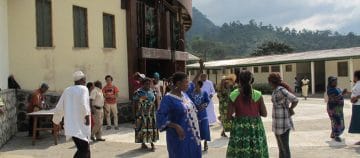
Sep 12, 2018 | Focolare Worldwide
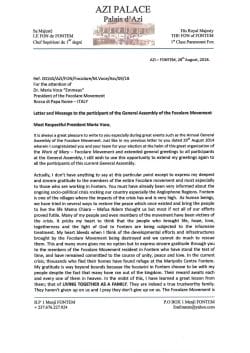 In the letter addressed to “the highly esteemed President Maria Voce”, Asabaton Fontem Njifua, the highest traditional authority of the place where the Focolare town is located (southeast of Cameroon), wrote: “I’ve nothing particular to say – he said in the letter sent on 28 August from Palias d’Azi – if not to express my deepest and sincere gratitude to the members of the Focolare Movement, especially those working in Fontem.” “You must have already been informed of the socio-political crisis rocking our country, especially in the Anglophone regions. Fontem is one of the villages that have been strongly hit by the crisis.” Recalling that one of his predecessors had named Chiara Lubich in 2000, as the “queen sent by God,” the Fon used bitter words to describe the current situation: “As human beings, we have tried in several ways to restore the peace that once existed and to bring the people to live the life which Mama Chiara – Mafua Ndem taught us. But the most part, if not all of our efforts, have been useless. Many of my people and even members of the Movement have been victims of the crisis. I think of the people who brought life, hope, love, togetherness and the light of God to Fontem, and who are now being subjected to inhuman treatment. My heart bleeds when I think of the development efforts and the infrastructure brought by the Focolare Movement, that are being destroyed. This and many other things push me to express my sincere gratitude to all the members of the Movement living in Fontem, who have stood the test and have remained committed to the cause of unity, peace and love.”
In the letter addressed to “the highly esteemed President Maria Voce”, Asabaton Fontem Njifua, the highest traditional authority of the place where the Focolare town is located (southeast of Cameroon), wrote: “I’ve nothing particular to say – he said in the letter sent on 28 August from Palias d’Azi – if not to express my deepest and sincere gratitude to the members of the Focolare Movement, especially those working in Fontem.” “You must have already been informed of the socio-political crisis rocking our country, especially in the Anglophone regions. Fontem is one of the villages that have been strongly hit by the crisis.” Recalling that one of his predecessors had named Chiara Lubich in 2000, as the “queen sent by God,” the Fon used bitter words to describe the current situation: “As human beings, we have tried in several ways to restore the peace that once existed and to bring the people to live the life which Mama Chiara – Mafua Ndem taught us. But the most part, if not all of our efforts, have been useless. Many of my people and even members of the Movement have been victims of the crisis. I think of the people who brought life, hope, love, togetherness and the light of God to Fontem, and who are now being subjected to inhuman treatment. My heart bleeds when I think of the development efforts and the infrastructure brought by the Focolare Movement, that are being destroyed. This and many other things push me to express my sincere gratitude to all the members of the Movement living in Fontem, who have stood the test and have remained committed to the cause of unity, peace and love.”  “In the current crisis – the king explained – thousands of people have fled their homes to find refuge in the Mariapolis Center of Fontem. My gratitude is way beyond bounds because the focolarini choose to be with my people, despite the fact that many have run away from the country. The reward awaits each and every one of them in heaven. In the midst of this, I have learned a great lesson from them – that of LIVING TOGETHER AS A FAMILY. They are indeed a true, trustworthy family. They haven’t given up on us and I pray they do not do so. The Focolare Movement is like the backbone of Fontem, without which we are nothing.” After urging us to pray to the Father for his people, and that peace return to Cameroon, the Fon concluded: “Our greatest desire is to live the words of Mama Chiara ’THAT ALL MAY BE ONE.’ Remember us in your prays because prayers are all we need now. Man has failed but God cannot fail.” See letter of HM Fon of Fontem
“In the current crisis – the king explained – thousands of people have fled their homes to find refuge in the Mariapolis Center of Fontem. My gratitude is way beyond bounds because the focolarini choose to be with my people, despite the fact that many have run away from the country. The reward awaits each and every one of them in heaven. In the midst of this, I have learned a great lesson from them – that of LIVING TOGETHER AS A FAMILY. They are indeed a true, trustworthy family. They haven’t given up on us and I pray they do not do so. The Focolare Movement is like the backbone of Fontem, without which we are nothing.” After urging us to pray to the Father for his people, and that peace return to Cameroon, the Fon concluded: “Our greatest desire is to live the words of Mama Chiara ’THAT ALL MAY BE ONE.’ Remember us in your prays because prayers are all we need now. Man has failed but God cannot fail.” See letter of HM Fon of Fontem
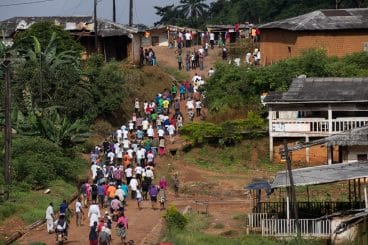
Jan 31, 2018 | Focolare Worldwide
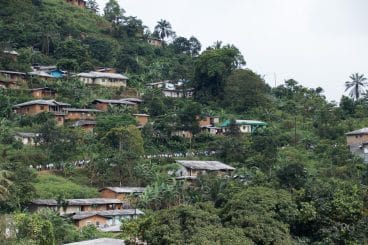 Cameroon, in the equatorial region of West Africa, is composed of two groups of regions that speak French and English respectively. The differences between them are not limited to language, but also some aspects of public administration. An escalation of violence is threatening the country of 23 million people livining within a territory of 475 thousand square kilometers. Raphaël Takougang, a Cameroonian lawyer and member of the Focolare, who now lives in Italy, explains: “The francophone part became independent on January 1, 1960. For the English-speaking part there was a referendum on October 1, 1961 to decide whether or not to join neighbouring Nigeria, which was already Anglophone, or stay with Cameroon. The northern part of this region chose to join Nigeria, the south preferred to stay with Cameroon. Thus was born a Federal Republic with two states, East Cameroon and South Cameroon, each with its own institutions – Parliament, government, legal systems – and others at the federal level. On May 20, 1972, another referendum resulted in the United Republic of Cameroon. In 1984, a small change in the Constitution removed the word “united” and, from then on, the country has been called the Republic of Cameroon. Ever since 1972 the malaise has been growing among the Anglophones who are a strong minority in the country, and there is even a name for it: the Anglophone problem.
Cameroon, in the equatorial region of West Africa, is composed of two groups of regions that speak French and English respectively. The differences between them are not limited to language, but also some aspects of public administration. An escalation of violence is threatening the country of 23 million people livining within a territory of 475 thousand square kilometers. Raphaël Takougang, a Cameroonian lawyer and member of the Focolare, who now lives in Italy, explains: “The francophone part became independent on January 1, 1960. For the English-speaking part there was a referendum on October 1, 1961 to decide whether or not to join neighbouring Nigeria, which was already Anglophone, or stay with Cameroon. The northern part of this region chose to join Nigeria, the south preferred to stay with Cameroon. Thus was born a Federal Republic with two states, East Cameroon and South Cameroon, each with its own institutions – Parliament, government, legal systems – and others at the federal level. On May 20, 1972, another referendum resulted in the United Republic of Cameroon. In 1984, a small change in the Constitution removed the word “united” and, from then on, the country has been called the Republic of Cameroon. Ever since 1972 the malaise has been growing among the Anglophones who are a strong minority in the country, and there is even a name for it: the Anglophone problem. 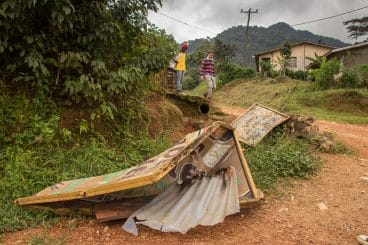 Ever since 2016 the crisis situation in the Anglophone region set off a series of strikes, first against teachers, then against lawyers. The people of the Mariapolis in Fontem, in the very heart of the Cameroon forest, explain: “While on the one hand the bishops had always encouraged dialogue, the boycotting of educational and justice institutions had an unexpected result on the crisis, which worsened with an escalation of strikes also among commercial businesses and transportation systems, in accordance with a strategy known as “Dead City.” No students showed up for the beginning of the last year school year. Despite the threats of reprisals against transgressors, here and there, some schools courageously opened their doors and others followed their example. The OLSW College in Fontem also resumed classes.” The Mariapolis in Fontem was born from the testimony of concrete love of some doctors, who arrived there in 1966, after the local bishop appealed to Chiara Lubich to take care of the Bangwa people, who were suffering from a very high infant mortality rate that was leading to their extinction. In a short time, thanks to the contribution of people from all over the world, Fontem equipped itself with schools, a hospital and other service facilities. Since then, the Bangwa people and several other neighbouring peoples have set out on the path of fraternity, which can be seen now in other citadels that have begun on the African continent. With its 80 thousand citizens, Fontem is a meeting and training place for people from all over Africa and the world. Here they experience how the exchange and collaboration among men and women of different races, cultures and traditions can bear fruits of brotherhood even in regions battered by conflicts.
Ever since 2016 the crisis situation in the Anglophone region set off a series of strikes, first against teachers, then against lawyers. The people of the Mariapolis in Fontem, in the very heart of the Cameroon forest, explain: “While on the one hand the bishops had always encouraged dialogue, the boycotting of educational and justice institutions had an unexpected result on the crisis, which worsened with an escalation of strikes also among commercial businesses and transportation systems, in accordance with a strategy known as “Dead City.” No students showed up for the beginning of the last year school year. Despite the threats of reprisals against transgressors, here and there, some schools courageously opened their doors and others followed their example. The OLSW College in Fontem also resumed classes.” The Mariapolis in Fontem was born from the testimony of concrete love of some doctors, who arrived there in 1966, after the local bishop appealed to Chiara Lubich to take care of the Bangwa people, who were suffering from a very high infant mortality rate that was leading to their extinction. In a short time, thanks to the contribution of people from all over the world, Fontem equipped itself with schools, a hospital and other service facilities. Since then, the Bangwa people and several other neighbouring peoples have set out on the path of fraternity, which can be seen now in other citadels that have begun on the African continent. With its 80 thousand citizens, Fontem is a meeting and training place for people from all over Africa and the world. Here they experience how the exchange and collaboration among men and women of different races, cultures and traditions can bear fruits of brotherhood even in regions battered by conflicts.  “The Catholic college in Fontem suffered an attack,” the locals have reported, “but many people of the village have come to help students and teachers, even at the risk of their own lives. With the approach of the anniversary of the aforementioned referendum, of October 1, which is such an historical date for the Anglophone region of Cameroon, violent demonstrations were feared, and the Focolare community organized prayer groups that included people from other regions of the country and from abroad. There has been no loss of life in Fontem. Every occasion is good for building relationships with the various civil, traditional and ecclesial authorities. We try to help those near to us to go beyond the fears, to create family moments, starting from those closest to us, who are often confused by the many voices and the media. The young people have organized “talent show” evenings and the “Sports for Peace” event to promote a more positive spirit “. “All during this period, even in the midst of difficulties – they conclude – the life of the Focolare community has continued. We hope that this challenge of love for all will enable us to discern and to act for the good of our country “.
“The Catholic college in Fontem suffered an attack,” the locals have reported, “but many people of the village have come to help students and teachers, even at the risk of their own lives. With the approach of the anniversary of the aforementioned referendum, of October 1, which is such an historical date for the Anglophone region of Cameroon, violent demonstrations were feared, and the Focolare community organized prayer groups that included people from other regions of the country and from abroad. There has been no loss of life in Fontem. Every occasion is good for building relationships with the various civil, traditional and ecclesial authorities. We try to help those near to us to go beyond the fears, to create family moments, starting from those closest to us, who are often confused by the many voices and the media. The young people have organized “talent show” evenings and the “Sports for Peace” event to promote a more positive spirit “. “All during this period, even in the midst of difficulties – they conclude – the life of the Focolare community has continued. We hope that this challenge of love for all will enable us to discern and to act for the good of our country “.




 Cameroon
Cameroon